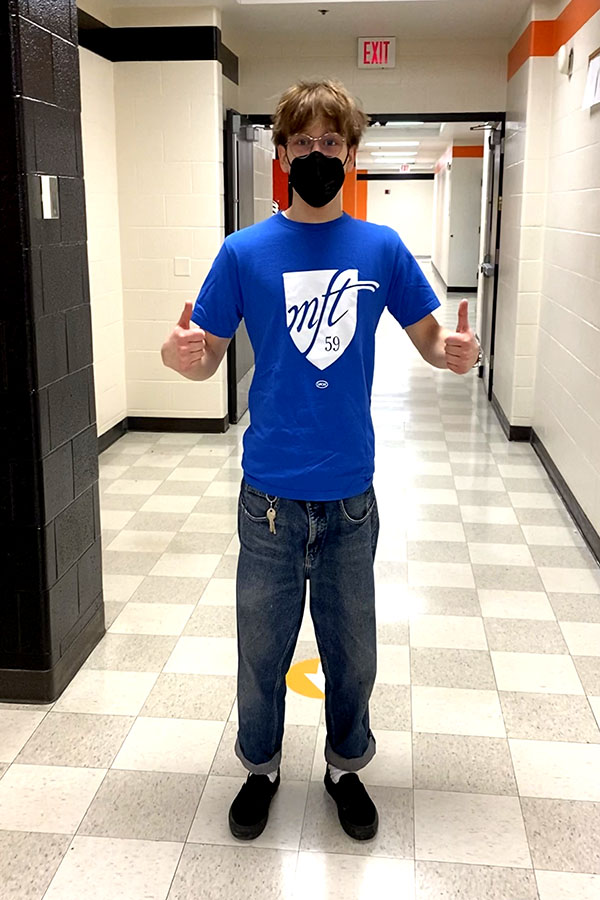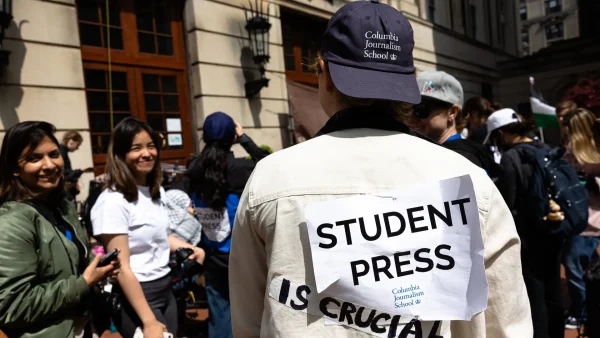MPS teachers to strike for first time in 50 years
Senior Graham Doyle poses with a Minneapolis Federation of Teachers union shirt in support of the likely upcoming strike.
February 16, 2022
This article has been updated as of 2/17/22 to reflect ongoing changes.
Minneapolis Federation of Teacher members voted on February 15th and throughout the week to decide if they are going on strike for the first time since 1970. The results have been tallied as of the 17th. For the teacher chapter of the union there was a turnout of 96% (2991), and 97% (2899) of those voted, said yes to the strike. The Education Support Professionals (ESP) chapter had similar results: 93% (942) voter turnout, and 98% of those who voted said yes to the strike. This comes as a result of two-years of negotiations for a new contract with Minneapolis Public Schools; an agreement for a new contract has not been reached. “We’ve spent at least the last decade that I’ve been here sort of arguing over crumbs and now I think we’re seeing the effects of that,” said Joshua Fisher, a South social studies teacher.
Since more than 50% +1 of MFT members vote yes to the strike, the executive board will make a final decision to schedule it. There are limitations on when the union can call it, and there is a waiting period between the announcement and the strike itself. This means that at the earliest it would happen in the beginning of March. During the waiting period negotiations with the district will commence to see if a resolution can be reached before the strike itself. If the strike goes forward, all MPS schools will be closed. Kristen Gupta, a French teacher at South, says that the strike is an intentional escalation tactic, not because educators have a desire to strike, but because the district is forcing their hand. “No one really wants to do this, but if we don’t do something different we aren’t going to get a different result.”
If a strike happens, educators who are striking won’t be paid. According to Gupta, it is even possible that the district may lock teachers out of their emails. It is also likely that teachers will picket in front of schools or MPS buildings.
An important question to ask is what has impeded the ability of MPS and MFT to reach a new contract. “The biggest thing that is being asked for is that everyone supports paying our Educational Support Professionals a living wage,” says Mary Manor, an English teacher who has been a member of MFT since they joined MPS. MFT is asking that the base salary for ESPs be increased to $35,000, which is what the union will consider a living wage. Fisher added, “There is evidence that the wages for ESPs are so low that some of them are struggling to get by, struggling with houslessness, and not able to take care of their or their family’s basic needs. When you have educators coming into the building with those stresses in their lives that carries over into what they are able to do and provide for students.”
Other things the union is fighting for includes putting a cap on class sizes, provide more mental health support for students and bringing in more counselors and social workers, creating additional aid to help account for the pandemic, and improving the quality of education for students with special needs.
Superintendent Ed Graff sent an email to staff explaining the district’s position as the MFT vote happens this week. “We know based on employee demographics and recent hiring trends, these staffing cuts tend to disproportionately impact our staff of color,” says the email. This is why one of the union’s demands is to retain and support educators of color. “As a teacher of color it’s really hard sometimes to be in this profession. I want to see that this is a profession that people can make their career in because most of the students we teach are students of color. Our students need to see themselves in their teachers,” said Gupta.
Manor says they have been teaching at South for about ten years, “On paper it looks like I make more money than I did 10 years ago, but when you count for inflation I actually make about $5,000 less in purchasing power than I did 10 years ago.” Superintendent Graff’s email states, “MFT’s proposals are not fiscally feasible… significantly higher salary increases are impossible at this time.” The district has received money in the past year as Covid relief funds and could petition for more. “[The district’s] model looks at public school as a business as opposed to an essential service. In my opinion that’s the wrong way to look at it,” said Manor.







Sharon • Feb 17, 2022 at 6:06 pm
Went on strike 50 years ago, most of the issues have not changed. Doesn’t look like they ever will be resolved!
Eva Shellabarger • Feb 17, 2022 at 9:34 am
Excellent article – as a former south high journalist and current ESP in minneapolis I appreciate your coverage of the strike!